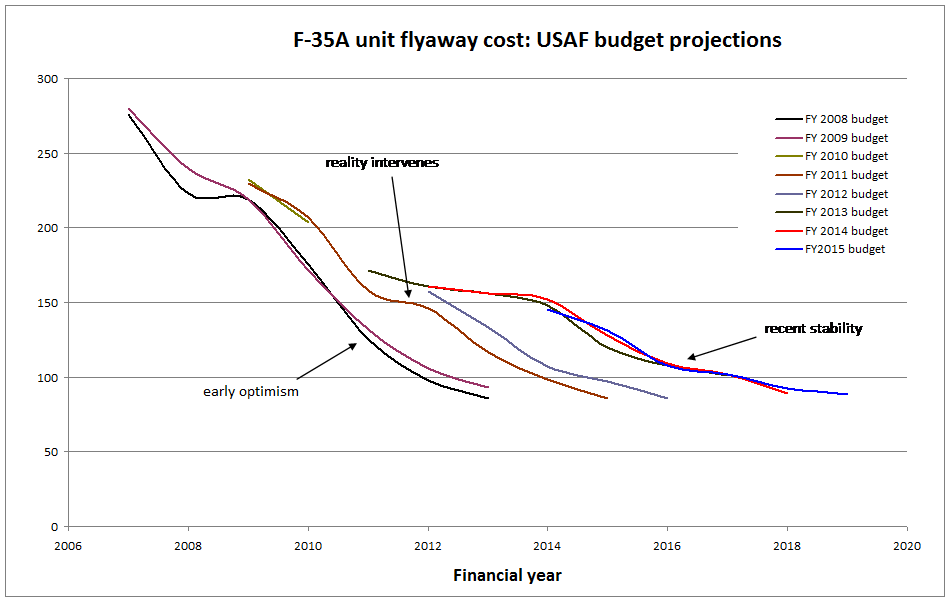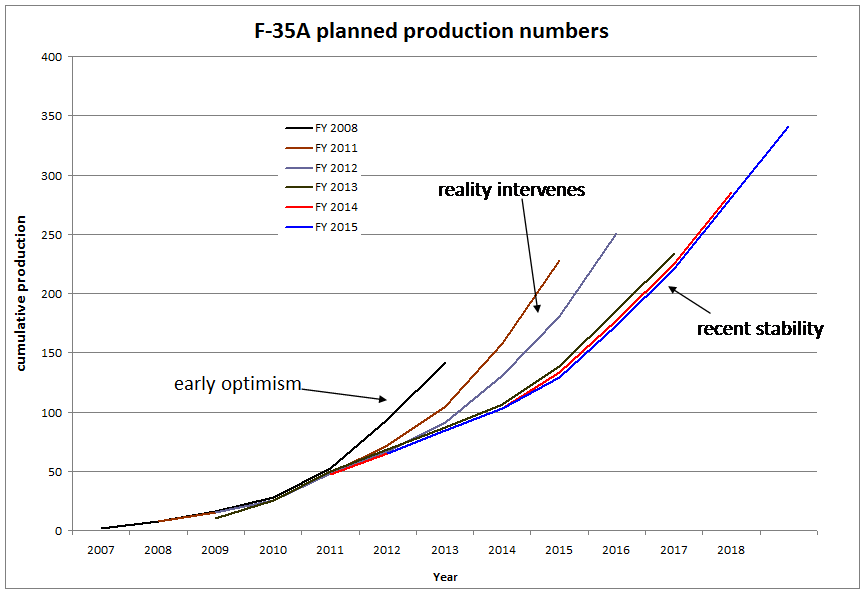Graph of the week: F-35 update
Posted By Andrew Davies on March 21, 2014 @ 06:00
The National Security Committee of cabinet will soon consider a submission from Defence regarding the proposed approval of a buy of (probably) 58 F-35 Joint Strike Fighters in addition to the 14 already approved.
We’ll be publishing a discussion paper on Monday that looks at the pros and cons of that proposition. And it won’t be a surprise that one of the major issues will be the state of the F-35 development and production program. The F-35 and the process of developing it have been subject to some trenchant criticism over the years—and with good reason. The performance of the prime contractor has left much to be desired at times, and the apparently hands-off management practiced by the Pentagon in the early years led to a series of cost increases and schedule slippages.
Some of those trends weren’t surprising, as early estimates of costs were well below the historical trend for combat aircraft. (The most recent ones certainly aren’t.) And the joint development of three very different variants—one for conventional takeoff and landing, one designed for carrier operations and a ‘jump jet’ for the US Marines—meant that initial schedules were seriously optimistic.
But some of the underperformance could squarely be sheeted home to poor program management. Combined with a tendency of those involved in program management and execution to downplay all of the increasingly obvious problems, a serious credibility issue developed. Some of us got to the point where a comment from an F-35 spokesman that it was a nice day would require confirmation from the US Government Accountability Office.
That’s all part of what the now head of program Lt General Chris Bogdan described here in Australia last week as the ‘tragic history’ of the F-35 program. But he also went on to describe a much tighter management approach today that has seen much improved performance against the program’s 2011 revised milestones. Let’s see what this year’s Pentagon budget papers [1]—released last week—have to say about that.
The first chart (click to enlarge) shows the budget cost planning figures for each of the budgets since the 2008 financial year request (in March 2007). The three phases—I’ve labelled them ‘early optimism’, ‘reality intervenes’ and ‘recent stability’—are clearly visible. For aircraft purchased later this decade, as Australia’s planning to do, there’s been little change in the last three budget cycles. (All prices in 2014 US$ millions.)
The second chart shows the planned cumulative production numbers of the Air Force variant. The same three phases are obvious.
The same conclusion as last year applies—where the F-35 is concerned, the US Air Force is determined to put its money where its mouth is these days. Given the difficult budget environment in Washington, that’s no small vote of confidence.
Of course, there are factors other than program stability to be considered when deciding whether to spend billions of taxpayer’s dollars. We’ll come back to those next week.
Disclosure: Lockheed Martin, the prime contractor on the F-35 program, is a corporate sponsor of ASPI.
Andrew Davies is senior analyst for defence capability at ASPI and executive editor of The Strategist.
Article printed from The Strategist: https://aspistrategist.ru
URL to article: /graph-of-the-week-f-35-update/
URLs in this post:
[1] this year’s Pentagon budget papers: http://comptroller.defense.gov/budgetmaterials.aspx
[2] Last year: https://aspistrategist.ru/graph-of-the-week-up-up-but-finally-away/
[3] Image: https://aspistrategist.ru/wp-content/uploads/2014/03/F35-Graph-11.png
[4] Image: https://aspistrategist.ru/wp-content/uploads/2014/03/F35-Graph-2.png
Click here to print.

